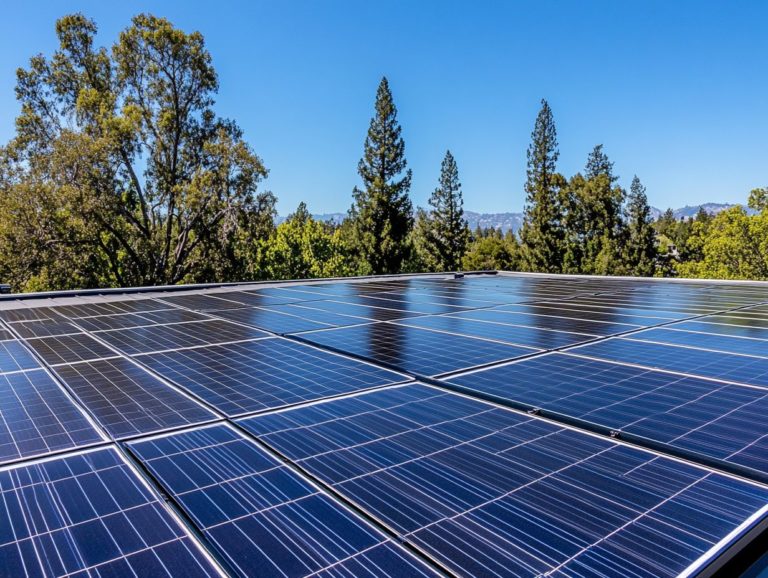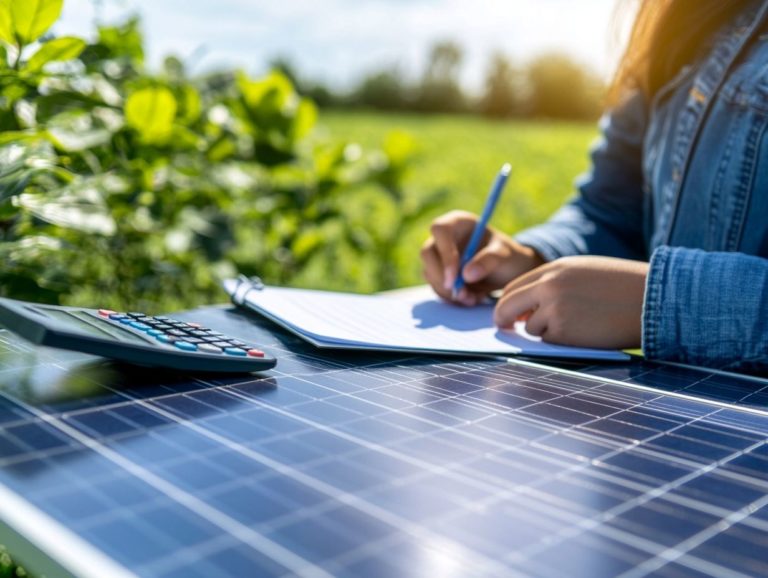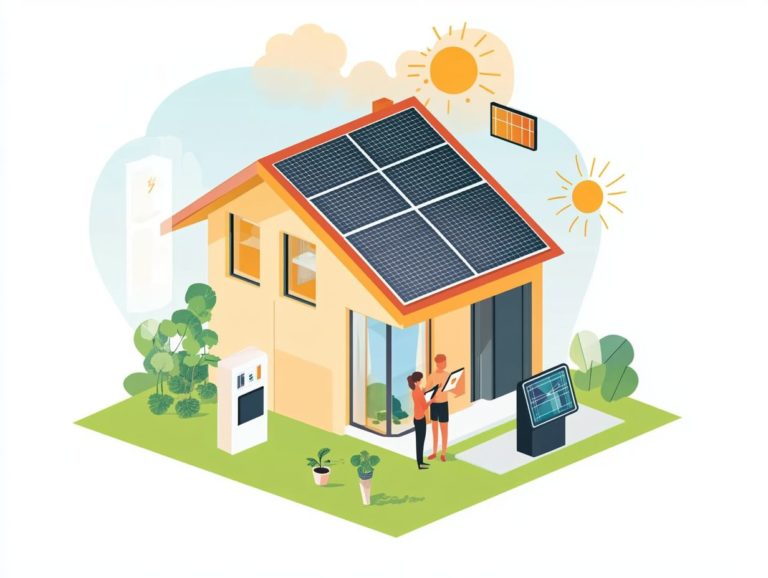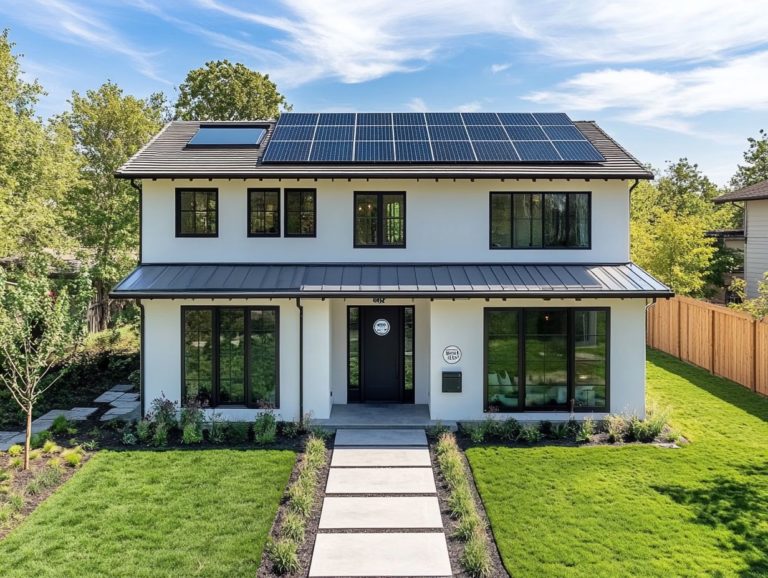What to Ask Before Installing Solar Panels?
Are you thinking about a transition to solar energy? With growing environmental concerns and escalating energy costs, solar panels are increasingly appealing for both homeowners and businesses.
This guide will equip you with the fundamental details about solar panels, showcasing the myriad environmental and financial advantages they offer.
Before you take the plunge, we ll tackle essential questions regarding your energy needs, the installation process, and the financing options available to you. We ll help you choose the right installation company.
Discover everything you need to harness the power of the sun!
Contents
- Key Takeaways:
- Benefits of Installing Solar Panels
- Questions to Ask Before Installing Solar Panels
- Financing and Incentives
- Find Your Perfect Solar Panel Installation Partner!
- Factors to Consider
- Researching and Comparing Companies
- Frequently Asked Questions
- What factors should I consider before installing solar panels?
- Will my roof be suitable for solar panel installation?
- How much will it cost to install solar panels?
- What is the expected return on investment for installing solar panels?
- Are there any local regulations or incentives for installing solar panels?
- What maintenance is required for solar panels?
Key Takeaways:

Understanding your energy needs is crucial before installing solar panels to ensure they will adequately meet your electricity requirements. Be sure to research and compare different solar-panel installation companies to find the best fit for your needs and budget. Before committing to installing solar panels, ask about financing options, incentives, and the installation process to make an informed decision.
What Are Solar Panels?
Solar panels are remarkable devices that convert sunlight into electricity, using a technology that converts sunlight into electricity.
These systems consist of multiple solar panels that gather sunlight and convert it into usable electrical energy. This reduces your dependence on traditional utility sources while promoting energy efficiency.
By incorporating solar technology into your home or business, you can significantly lower your utility costs and positively contribute to the environment.
Among the various options available, monocrystalline panels stand out for their high efficiency and sleek appearance, while polycrystalline panels provide a budget-friendly yet effective alternative.
Each type features cells made from silicon, which are essential for the energy conversion process. Recent advancements in solar technology have led to innovative designs and improved efficiencies, making installation more accessible and appealing.
Leading manufacturers like LG and Panasonic are pushing the boundaries of panel performance, ensuring that you have access to top-tier options.
The widespread adoption of solar energy not only helps reduce carbon footprints but also emphasizes sustainability, playing a significant role in the fight against climate change.
Benefits of Installing Solar Panels
Installing solar panels offers great benefits, merging impressive energy savings with considerable environmental advantages that champion sustainability.
Not only do residential solar systems enable you to significantly cut down on your electricity bills, but they also unlock a range of solar incentives and tax credits that can ease the financial strain of installation.
By embracing solar energy, you can look forward to substantial long-term savings, support renewable resources, and play a vital role in fostering a cleaner planet.
Environmental and Financial Advantages
Solar panels save you money and help the environment. They not only help you cut down on utility costs, but they also pave the way for a more sustainable future.
By tapping into clean energy, you can significantly reduce greenhouse gas emissions, contributing to the fight against global warming while promoting energy efficiency. On the financial side, you can take advantage of the solar tax credit, which lowers your installation costs and boosts your long-term savings on electricity bills.
This green technology also minimizes water usage in energy production, which is crucial when you consider that traditional energy sources can consume hundreds of gallons per megawatt-hour. In fact, solar power could save around 600 billion gallons of water annually by 2030, showing its environmental impact.
Working with professionally certified solar installers guarantees that your installation will be both efficient and up to high standards, maximizing your energy savings. If you choose to invest in a solar battery, you can further elevate your energy independence, potentially saving you thousands over time.
Statistics indicate that combining residential solar systems with battery storage can lead to a remarkable 60% reduction in monthly electricity bills, making this option increasingly appealing for anyone looking to embrace sustainable living.
Questions to Ask Before Installing Solar Panels
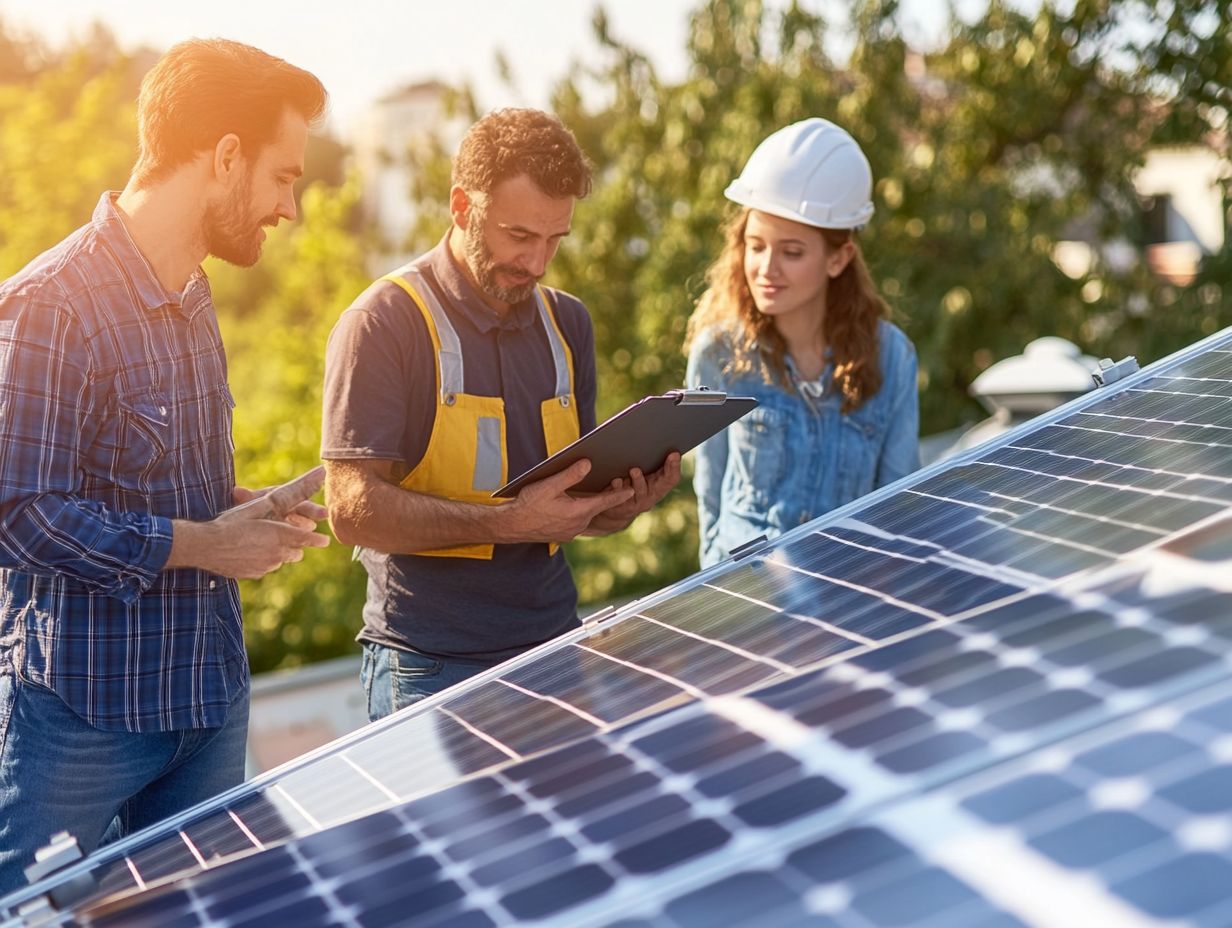
Before installing solar panels, consider key questions that will guide you through the process. This includes exploring financing options and assessing the credibility of potential solar contractors.
Grasping the intricacies of the installation process will equip you with realistic expectations. Investigating financing avenues like payment plans can significantly enhance the accessibility of solar energy systems.
Seeking customer references and reviews promotes transparency. It empowers you to choose a reputable provider with confidence.
Assessing Your Energy Needs
Assessing your energy needs before installing solar panels is crucial to ensure your system meets your specific requirements. Evaluate your current utility costs and consumption patterns to create a tailored solar energy solution that maximizes both energy production and savings.
Implementing solar production monitoring systems can further optimize your energy usage. This helps you adjust your consumption habits accordingly. Review your past utility bills to identify trends in energy consumption and understand peak usage times, which can significantly influence the efficiency of your solar system.
Consulting with professionals during this analysis is essential. They can offer valuable insights into the appropriate system size and configuration based on your individual usage profile. Various technologies, such as smart meters and apps, are at your disposal to monitor solar production in real-time, enabling efficient tracking of your energy generation and consumption.
Understanding the Installation Process
Knowing the installation process is crucial! It prepares you for every step from consultation to completion.
The process usually kicks off with a site assessment conducted by certified solar contractors. They’ll evaluate your roof’s suitability and design a customized solar energy system tailored to your needs.
Be aware of the necessary permits, inspection stages, and warranty coverage provided by installation companies. This ensures you have peace of mind throughout the entire process.
The initial step often involves in-depth conversations with your contractor. This gives you the opportunity to express your energy needs and preferences.
Once the site assessment is complete, design approvals are sought. You’ll receive a detailed plan and cost estimate for your confirmation. During this phase, customer references become invaluable; insights from past clients can shed light on a contractor’s reliability and workmanship.
After you give the green light, the actual installation begins, typically spanning a few days. Post-installation support, including maintenance and troubleshooting, is equally crucial. Make sure your contractor offers comprehensive warranty options to protect your investment.
Financing and Incentives
Explorar opciones de financiamiento e incentivos solares es esencial para propietarios como t que est n considerando la instalaci n de paneles solares. Esto puede influir enormemente en el costo total del sistema.
Con diversas v as de financiamiento disponibles, incluidos pr stamos y arrendamientos, los sistemas de energ a solar se vuelven mucho m s accesibles. Adem s, los cr ditos fiscales solares y los incentivos locales pueden reducir notablemente tus gastos iniciales.
Al comprender tus ahorros estimados a lo largo del tiempo, puedes tomar decisiones bien informadas sobre tus inversiones solares. Por ejemplo, los arrendamientos solares te permiten disfrutar de la energ a solar sin una gran inversi n inicial; b sicamente, est s alquilando el sistema por una tarifa mensual.
Por otro lado, los acuerdos de compra de energ a (PPA) significan que solo pagas por la energ a que se produce realmente. En estados como California, puedes beneficiarte de generosos cr ditos fiscales solares que cubren una parte significativa de los costos de instalaci n.
Estos incentivos, junto con los servicios p blicos locales, resultan en impresionantes ahorros a largo plazo en tus facturas de energ a. Texas presenta ventajas similares, ofreciendo reembolsos e incentivos basados en el rendimiento que mejoran la asequibilidad de la energ a solar y fomentan una adopci n m s amplia.
Al aprovechar estas diversas opciones de financiamiento e incentivos, puedes mejorar significativamente la viabilidad financiera de tus soluciones solares.
Find Your Perfect Solar Panel Installation Partner!

Choosing the right solar panel installation company is crucial for your success! This selection directly influences the quality of the installation and the long-term performance of your solar systems.
Seek out contractors certified by the North American Board of Certified Energy Practitioners (NABCEP). They should possess both experience and a solid reputation in the industry, ensuring adherence to best practices and standards.
Check customer references to enhance your trust in the provider. Understanding warranty coverage will also boost your confidence in your decision.
Factors to Consider
When selecting a solar company for your installation, consider several important factors for a truly satisfactory experience. Evaluate the installation process, paying attention to timelines, project management, and communication.
Understanding the warranties offered for both equipment and installation services is equally important. Customer references can provide invaluable insights into the company’s reliability and quality of work, guiding your decision-making process.
Assessing the company’s experience in the solar industry is vital; a seasoned contractor is far more likely to navigate potential challenges with ease. The quality of the solar equipment they use is another critical consideration.
Reputable companies typically source their components from well-known manufacturers, ensuring that you benefit from durability and efficiency. Exploring financing options can also make solar installations more accessible, with various plans tailored to different budgets.
Excellent customer service is essential, as it reflects the company’s commitment to supporting you throughout the installation process and beyond. Ultimately, conducting thorough research on your preferred contractors will help you align better with your energy needs and financial expectations.
Researching and Comparing Companies
Researching and comparing solar contractors is an essential step in selecting the ideal solar company for your installation needs. Gather multiple quotes to assess costs and services offered.
Investigate customer references to understand past performance and satisfaction levels. Pay particular attention to the installation warranty; it acts as a crucial safeguard against potential post-installation issues.
Utilizing online reviews and consumer reports can truly transform this process, offering valuable insights into the experiences of previous customers. Checking for certifications and affiliations with reputable organizations will further bolster your confidence in a contractor’s credibility.
It s not just about the bottom-line pricing; evaluate the overall value provided, including the quality of materials used and the level of post-installation support. Comparing warranty provisions is equally important, as they can vary significantly among companies and greatly influence your long-term satisfaction and cost-effectiveness.
Questions to Ask Potential Companies
Asking the right questions when approaching potential solar contractors can significantly shape your decision and ensure a seamless installation process. You’ll want to inquire about the installation process, timelines, and any necessary permits.
Also, ask about financing options and payment plans. Request customer references to check the contractor’s experience and quality of service. Check out the contractor s certifications to ensure they are top-notch!
Understanding their past projects will give you valuable insight into their expertise and reliability. Ask about warranty coverage now to ensure you have long-term support.
Clarifying post-installation assistance, including maintenance services and response times for any potential issues, is equally important.
Don t hesitate to voice any uncertainties during your discussion; clear communication can lead to more informed decisions and a far more satisfying experience overall.
Frequently Asked Questions
Here are some common questions you might have before deciding to install solar panels.

What factors should I consider before installing solar panels?
Before installing solar panels, consider your energy needs, budget, roof orientation and condition, and local regulations and incentives.
Will my roof be suitable for solar panel installation?
The suitability of your roof for solar panel installation depends on its orientation, pitch, shading, and structural integrity. A professional installer can assess your roof and determine its suitability.
How much will it cost to install solar panels?
The cost of installing solar panels varies depending on factors such as the size of the system, type of panels, and installation fees. It is recommended to get quotes from multiple installers and compare prices before making a decision.
What is the expected return on investment for installing solar panels?
The return on investment for solar panels can vary depending on your location, energy usage, and the cost of installation. On average, homeowners can expect to recoup their investment within 6-10 years and see significant savings on their electricity bills over the lifespan of the system.
Are there any local regulations or incentives for installing solar panels?
Yes, there may be local regulations and incentives for installing solar panels, such as rebates and tax credits. Research and understand these regulations and incentives before installing solar panels.
What maintenance is required for solar panels?
Solar panels require very little maintenance, but it is recommended to regularly clean the panels and inspect for any damage or debris. Some installers may offer maintenance packages for an additional fee.


